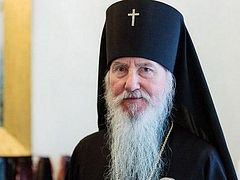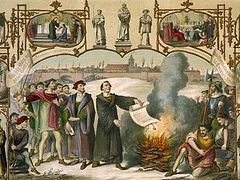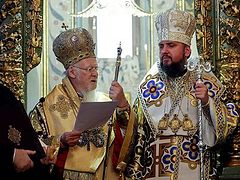In the recent statement by the Church of Cyprus they say:
How much are we risking with regard to the faith when we interrupt Eucharistic communion between our Churches? The Apostle Paul is clear how we prove that we “endeavor to keep the unity of the Spirit in the bond of peace” and that we prove that we are “one body and one Spirit… one Lord, one faith, one baptism” (Ephesians 4:3-5). The Holy Eucharist, through which the people are sanctified, must remain outside Ecclesiastical disputes.
The proclamation of the granting of autocephaly to the Church of Ukraine by the Ecumenical Patriarchate was done with the purpose of restoring peace and realizing the unity of the Church there.
I have to ask, can we assert a righteous purpose if this is pursued by lawless means? I also have to ask, is it not a long-standing tradition of the Church to respond to lawlessness not only with words, but with a break of Eucharistic communion?
The question I think that needs asked is—is the issue in the present case simply a territorial dispute? I have to agree with Cyprus that arguing over territory is a worldly occupation and does not forward the witness of the Church. As St Paul says, Why not rather be wronged? (1 Cor. 6:7). Certainly the concern of the Russian Church to protect the place where it had its Baptism is something we can have sympathy with. The Greeks too have sorrowed over losing Constantinople to the Turks. But is this merely a case of arguing over territory? If the Russian hierarchy has broken communion only because they are concerned for protecting their territory then they have fallen short of the call to humble acceptance of the circumstance God has given in terms of the political changes that happen in the world. If their concern is only self-centered, there is no excuse and they ought to restore communion with Constantinople. If however, there is a genuine concern that a certain lawlessness in Church life is being promoted and even legitimized then they are justified.
If the Ecumenical Patriarch is interested in peace and unity, why then has he completely disregarded Metropolitan Onufry’s interests and position in Ukraine? He has not only not reached out to dialogue as an effort toward making peace, he has not even rebuked Poroshenko for the lawless persecution of Met. Onufry’s flock. He has not only not rebuked Poroshenko, he has in fact disenfranchised Met. Onufry, calling him a renegade, and legitimizing schismatics. This latter act is one of pure lawlessness. Constantinople has shown no brotherly concern for the canonical Ukrainian church.
If the Church does not act as a conscience to the society it lives in and a restraint on lawlessness then it has completely lost its purpose in that society. Far from rebuking Poroshenko for his hateful and peace-breaking rhetoric and harsh laws, Constantinople and the schismatics have empowered and supported Poroshenko in his position. By its silence, Constantinople has legitimized the persecution. The Greeks and Cypriots need to read Met Onufry’s statements again and give them respect as coming from a Christian hierarch and not fall into disregarding them as Russian propaganda. The politically minded will hear everything as nothing but a political agenda. The Churchly minded will hear the genuine ecclesial concerns.
The Patriarchate of Constantinople has made it clear many times and has lately been very specific that it is trying to implement a policy of one jurisdiction per territory and to get rid of the ecclesiastical anomalies in the diaspora. It is under this reasoning that it dissolved the Russian Exarchate in Europe1. How then can it simultaneously justify setting up a parallel jurisdiction in Ukraine against the wishes of the canonical Church there? The Ukrainian Church may be autonomous under Russia, but that does not mean they have no independent mind or existence and thus can be ignored. Whoever mediates this dispute can’t mediate it as something simply between Russia and Constantinople. The experience of the canonical Ukrainian bishops of how to live the Christian life and witness in Ukraine and their point of view needs to be listened to. They are the primary ones harmed by Constantinople’s support for lawlessness. If they had been consulted, they would have told Constantinople the political ramifications of this whole fiasco.
Is anyone naive enough to think that if Met. Onufry’s group had joined in the new structure they would all be living in peace without persecution and pressure? Is anyone naive enough to think that the canonical Ukrainian bishops would not still be viewed by the government as a “fifth column” and still be viewed by Philaret’s group as a competitor? If they had joined Constantinople’s project, the same persecution and attempt to push them out would be going on, only undertaken with different measures.
A change in structure cannot bring about a change in heart. A change in structure has to be the outgrowth of a change in heart or the same sins will simply go on under a different guise. This maybe is the central point that needs to be considered. Anyone familiar with the monastic or spiritual life of the Church understands this basic truth. If the end goal is that the Church starts to reform society rather than society reforming the Church, then the spiritual laws need to be considered.
Poroshenko’s purpose is to get rid of anything that could act against his goals of controlling the country and moving it in a Western direction. Really, the latter is merely an excuse for the former. He is not so much interested in Western culture as he is in lessening the influence of the opposition political party. He has shown no interest in having a Church in his country acting as a Christian conscience. Philaret’s structure has also shown that it is interested primarily in its own power. There is no reason to believe that even if the canonical Church had joined the new structure these realities would change. As it is, Met. Onufry’s Church continues to have both internal freedom and also moral support from the Russian Church.
Does the history of the actions of Constantinople give any reason for the canonical Ukrainian Church to trust that it would protect them from the continued persecution and suppression of Poroshenko and Philaret’s church if they had joined the new structure, or does history show that Constantinople would take sides and protect only the Western-leaning bishops? Part of the distrust between Constantinople and the Slavic Churches is that Constantinople has consistently shown itself an ambassador for Western cultural values without any sensitivity to Russian culture and the good that is in it. If Constantinople wants to rebuild trust and be a global leader, it needs to repent of this one-sidedness and become more culturally aware. The Western understanding of freedom and the means for attaining it is not the same as what the Church teaches about spiritual freedom.
It may be that each nation has a right to its own autocephalous Church, but only if that nation’s leaders have shown that they have the willingness to cooperate with the law of God and be influenced by the Christian conscience of the local Church. The right to an autocephalous Church should not be considered automatic. It is not merely the rights of the people that should be considered, but since an autocephalous Church is primarily set up as a church-state symphony, the disposition of the political head has to be considered. At the very least Constantinople showed a considerable lack of discernment if it thought that Poroshenko wanted something genuinely Christian instead of merely a tool for his own political advancement. At worst we see that Constantinople is not willing to rebuke the Ukrainian government for abusing the trust that was given it along with the Tomos, nor using any influence to stop the persecutions and lawless laws.
In the end if there is a certain lawlessness of action and lack of discernment on the part of Constantinople, it is very hard to say that their purpose was peace. If what the Church wants is peace and the restoration of communion, then it is primarily up to Constantinople as leader to repent of lawlessness. Its actions have been done in public and have scandalized the faithful across the globe, not just in Russia and Ukraine, and it will be difficult to restore trust. While political authority is based primarily on power, spiritual authority is based on trust and the power of a holy life to attract followers. It is Met. Onufry in Ukraine, and similarly both the Russian and Serbian hierarchy who have the spiritual authority in this situation. Constantinople has a long history of being politically minded and concerned primarily for its own well-being and power. This is not going to heal all at once.
If what was causing turmoil and division was only political, and concerning the use of power things would heal fairly quickly; however, Constantinople has not even repented enough to take down the document “First Without Equals” or repudiate it in any way. It has also scandalized the faithful by a lawless and unilateral approach to the ecumenical movement, without concern for the conscience of the faithful. It has tended to look down on this conscience as “primitive”—an attitude which itself is a sign of spiritual sickness. Christ makes Himself known in the conscience of the faithful as a body, not merely in the hierarchs. Is it not lawful to resist this type of lawlessness, even if it means suspending communion?
Suspension of communion is meant as a path toward spiritual healing when other paths have not worked. If the current suspension of communion is merely a warning over territorial disputes, then Russia should reverse its decision; if however, the current suspension is a word of warning that spiritual illness has grown and spread in Constantinople, then let the other Churches quit hiding from the truth and work together to cure this illness. The very nature of unrestrained lawlessness is to cause division. There is no peace or unity when lawlessness reigns.
Instead of dancing around the issue of how autocephaly is granted, the Churches need to go back to the drawing board and hash out the whole issue of Constantinople’s privileges and power. This needs to be discussed and defined in a way that is acceptable to the majority of the Churches and in line with Orthodox ecclesiology. Currently Constantinople has been consistent in defending a position that admits of no limits to its authority, and sees itself as having its authority in itself instead of receiving it from the Church. This itself is lawlessness and a rejection of proper order in the Church.





Crimea is Ukraine according to the Moscow Patriarchate and the Ukrainian Orthodox Church (MP). Even after Russia's annexation, Crimea remains to this day under the jurisdiction of the UOC-MP.
What both the Moscow Patriarchate and the Russian government appear to be telling us is that Ukraine is ultimately a territory of Russia though, and not really a sovereign nation. Taking property from a sovereign nation on peaceful terms requires an agreement and usually compensation. That never happened, and the UOC-MP never defended Ukraine's sovereignty. So, it's the sovereignty of Ukraine that is being ignored and disputed by both the Russian government and the Moscow Patriarchate.
And I knew that this could easily be distorted and morphed into a power position by the ambitious.
Well, that has happened, as the newly coined "First Without Equals" can tell us.
Here is the oxymoron: if there are genuine "Equals", there can be no "Firsts", because they are indistinguishably "Equal": so how could one tell them apart? (All white "equal" ping-pong balls look alike!)
From an Orthodox point of view, the only way to be First, is to be Last, so the proper, Biblical phrasing for the leadership must be "Last Beneath Others"....
==============
The Cypriot synod also said, "The interruption of commemoration of a Primate by another Church for any administrative or jurisdictional reason whatsoever, does not bear witness to the Orthodox ethos of humility." This whole situation is not just 'any old reason', but involves a serious distortion of church life. I do not feel competent to talk about whether it was absolutely justified or not to break communion. I am just saying it was not completely unjustified. The canons allow for this kind of action over recognized heresy by a patriarch. While it is still in the process of being decided whether or not this is heresy, it is more than simply politics as normal.
There's nothing wrong with polemics; in fact, I think the issue in this article to some degree is that she wasn't polemical enough! I am constantly edified by Met. Luke of the UOC who is very polemical with this whole horrific situation and shows how great the canonical Church is.
My issue is that it doesn't address the actual topic and explain WHY ceasing communion is NOT an attack or abuse of the ROC. It is by no means an abuse, but that's the accusation leveled against us multiple times now so it'd be good to show why that is not the case and show examples of this done in history by the saints. Instead this piece merely stated it's not about territory and sorta ended it.
The Cyrpiot synod's statement seems to assume that Russia's actions are nothing more than "self-interested calculations". My point is that it is much more. The dispute between Antioch and Jerusalem can't be equated with this dispute. No one in that dispute was replacing a canonical church with a completely non-canonical one.
In a brief form, Anna is calling attention to the seriousness of breaking Eucharistic communion. She is helping people who may be thinking this is just a territorial cat fight to understand that there is actually much more in play regarding Istanbul's papal aspirations. Not everyone who reads this site is looking for a dry, footnoted, dispassionate tome in every article. Wisdom is justified by all her children, or something like that. I will be equally interested in reading the "proper" article you are preparing, R-monk.
Show the sources that talk about when, why, how, etc a church can break communion. Give historical examples. Instead we get a vague polemic-ish article that doesn’t actually contribute anything.